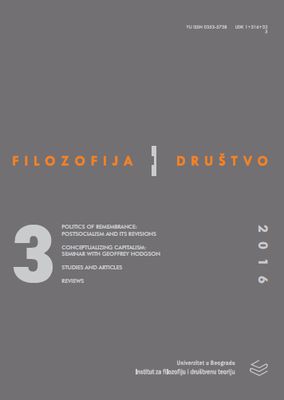
We kindly inform you that, as long as the subject affiliation of our 300.000+ articles is in progress, you might get unsufficient or no results on your third level or second level search. In this case, please broaden your search criteria.


Organized by opposition leader Navalny on a public holiday, the protests led to mass arrests in Russia’s two largest cities.
More...
Premier Grindeanu has refused to step down ahead of no-confidence motion next week.
More...
Boycott allowed ruling Georgian Dream party to push through amendments critics say will cement the party’s hold on power
More...
Nationalist, anti-immigrant coalition expected to join old pro Boyko Borisov's cabinet.
More...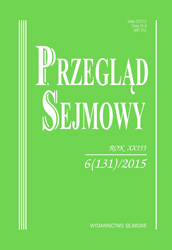
An important role in incorporating particular Member States in integration structures was played bymatters relating to the apportionment of powers between the state authorities to decide on matters relatingto membership in the EC/EU. The emergence and development of parliamentary committeesfor European affairs is connected with the desire to increase the impact of national legislative bodieson the European decision making process and to provide the representative bodies with mechanismsensuring real supervision over the actions of governments on the European scene. The committeesfor European affairs continue to have the nature of auxiliary bodies of parliament, however,due to the nature of problems undertaken by them, their high autonomy in relation to parliamentarychambers is evident. To some extent, even they replace parliamentary chambers in exercising theirpowers concerning the process of lawmaking in the EU. Recognizing this phenomenon, showing newtrends in relations between parliament and its committee is therefore of great importance for the researchin this field.
More...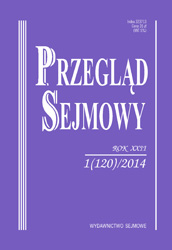
The basic thesis of this essay is that the reasons for the erosion of representative democracy should always be sought in the weakness of accountability mechanisms in governance, because these mechanisms are an inherent part of the process of delegation of representative functions. Both processes take place in the same location, but they are oriented in opposite directions. Firstly, the vertical mechanism of this accountability is founded upon and runs directly along with the delegation of power relations and the mechanism of horizontal accountability of power arises from the multiplication of vertical chains, which gives democratic legitimacy to the authorities (veto-actors) of a horizontal sequence. This article is an attempt to conceptualize the notion of “accountability of power” in relation to the symptoms occurring in the world crisis of representative democracy .
More...
The author distinguishes internal ( self-fi nancing ) and external ( direct and indirect ) models of politicalparty funding. Following an analysis, he concludes that public funds currently are, and mustremain, the main source of political party funding. Public funds are used to pay for current operationsand the reimbursement of election campaign expenses. The parties are also use their own sourcesof funding, not only membership fees. In many countries, an important role is played in this respectby donations, however, the problem arises of whether they can come only from individuals orthe legal persons. It is, therefore, reasonable to conclude that the dominant contemporary model ofpolitical party funding is a mixed model.
More...
Election protest is one of the institutions enabling the review of validity of elections. It is associatedwith judicial verifi cation. The Constitution does not regulate electoral protests, delegating that taskto the legislature. Provisions governing election protests in parliamentary elections are dispersedacross the Electoral Code. The Code does not contain specifi c rules regarding the conduct of electionprotests in elections to the Senate, but is limited to a general referring clause in Article 258,which required application of the provisions governing the validity of elections to the Sejm. Theground of the protest are acts constituting election offense or tort. According to the jurisprudence ofthe Supreme Court examining the election protests concerning parliamentary elections, any violationof the provisions of the Electoral Code will not necessarily lead to the declaration of invalidityof the election, although any such violation may give rise to election protest. There must be a causallink between the breach of the Electoral Code and the defectiveness of the process of voting andestablishing the election results. In judicial practice of the Supreme Court only in a few cases, the allegationsraised in election protests are considered to affect the outcomes of elections.
More...
From a potential referendum, to membership in the Eurasian Economic Union and the relationship with the EU, Igor Dodon and Pavel Filip cannot find any common ground.
More...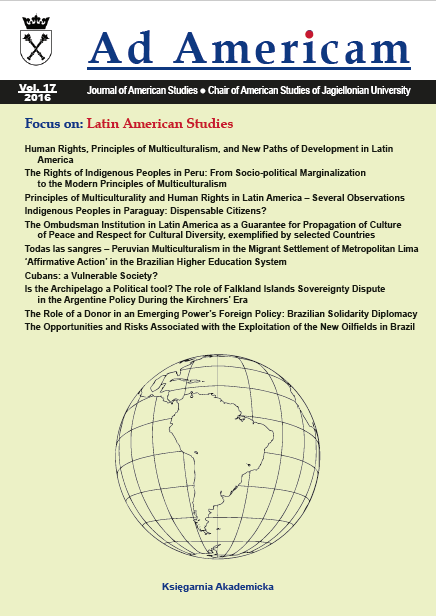
The institution of the ombudsman is present in the majority of Latin American countries. In spite of differences in nomenclature or structure, it is characterized by several common features. It is a sui generis state authority, enjoying extensive autonomy and independence. Its main objective is to promote and protect human rights, and the assistance it provides is free and easily available. Introduction of the institution in Latin American countries was related to the democratisation processes that began at the end of the 1980s. This article presents a comparative analysis of ombudsmen in El Salvador (a country with a history of long-term internal conflict), Peru (a country that advocates multiculturalism), and Argentina (a country with a history of military dictatorship). Detailed discussion is preceded by general remarks regarding the genesis, typology and characteristics of the institution. Common initiatives and associations of Ibero-American ombudsmen will also be discussed. This analysis and its conclusions will argue that the institution is both a tool for implementing a culture of peace, and a guarantee for the respect of cultural diversity in Latin America.
More...
This paper describes how general election presidential debates have changed over the last four decades. It will trace the development of the debate format, the dynamics of visual rhetoric, and the patterns of discourse; and will compare the standards followed by John F. Kennedy and Richard M. Nixon in the first series of general election presidential debates held in 1960, with those followed by Barack Obama and Mitt Romney in the latest series of debates held in 2012. It will also analyze debate videos and transcripts in order to identify the techniques used during both series of debates, and emphasize the similarities, differences, and effectiveness thereof. Considering the growing influence of the media on presidential campaigns over the last forty years, it is assumed that the rules and format for debates, as well as the dynamics of visual rhetoric and functions of debate discourse, have changed. This stands in contrast to the role of such debates in managing and guiding public opinion during elections, which has remained the same.
More...
The article provides an analysis of the existing legislation in the selected European countries whichhave adopted the instrument of a constructive vote of no confi dence (Germany, Spain, Slovenia, Hungary,Belgium and Poland). The author focuses on the procedural aspects of the issue. His intentionwas to show both similarities and differences in the existing regulatory framework. Under this assumption, the analysis covers all subsequent stages of the procedure for constructive vote of no con-fi dence, starting from the request and ending with the appointment of a new government.
More...
While EU Council head urges politicians not to aggravate ethnic tensions, Skopje blames Tirana for trying to undermine the constitutional order.
More...
This article examines new approaches to the constitutional principle of political representation, otherwise called indirect democracy or responsible government. However, as it turns out, this principle, which nowadays is the basis for all democracies, is subject to constant reinterpretation, mostly in rapidly developing political sciences. The traditional, which is typical to constitutional law, approach to representation as vesting (by the act of election) in the representatives (Members of Parliament) the right to act in the name and on behalf of voters, is today deemed undoubtedly insufficient. Consequently, new explanations and justifi cations for political representation are sought. Therefore, some recognize that representation is merely a simulation of that what those represented could do if they were capable of taking particular action, while others are likely to treat representation as substitution, i.e. traditional taking action for someone else. Representation is also seen as parallelization, that is reproducing by the representative of the traits of the represented person. Yet another different approach to representation considers it as a correlation, or striving to substantial consensus of appraisals of the representative and the represented person irrespective of the degree of similarity of their structural features, or in the category of a conversion, i.e. a transition of “an input” (of appraisals represented) to “an output”, i.e. the decision of a representative body. Representation is sometimes perceived from the perspective of interaction, deliberation, the right to veto or a complex control mechanism. All these approaches are common to the three major theories of representative democracy, which is either a replication (repetition of appraisals of the represented person), or an aggregation, i.e. an arithmetic sum of partial interests, or a deliberation, which means a search — irrespective of differences and dissimilarities — for the essence of representation as establishing the common good. The development of the above-mentioned new concepts and research approaches is enhanced by a phenomenon known as the crisis of representation, or failure of electoral mechanisms, which to date were the essence of representative democracy.
More...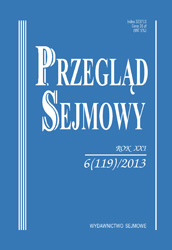
The Constitution of the Russian Federation of 5 December 1993, establishing a bicameral parliament (the Federal Assembly), does not provide specific rules for determining the composition of the upperchamber — the Council of the Federation. The authors of the Constitution restrict themselves todeclaration that this authority shall consist of includes two representatives from each subject of the Russian Federation (one from the legislative and one from the executive body of state authority), while the adoption of the procedure for its selection has been left for federal laws. The solutions establishedso far in this respect have proved to be unstable. The Federal Law of December 5, 2012,adopted the current procedure for creating the composition of the Council of Federation, the fourthsince its inception. All the solutions so far existing which are presented chronologically in the articlerefl ected different concepts of representation of the Federation’s subjects and were usually dictatedby current policy goals. They were of a unique character in comparison to the methods used forcreating compositions of second chambers in other federal countries. Moreover, they were subjectof permanent and lively disputes between the Russian constitutional law and political science theorists, also described in the article.
More...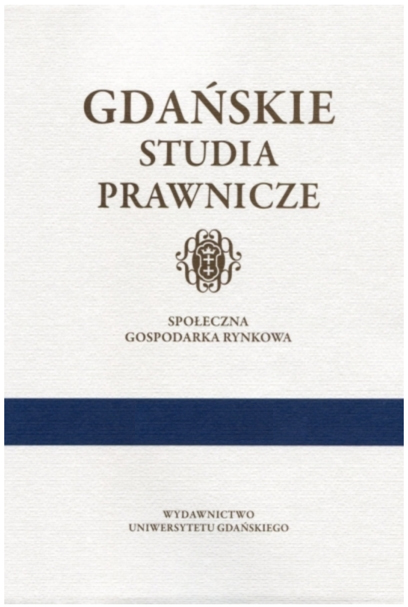
The government and the self-government of the municipality of Gdansk in the Versailles Free City of Gdansk (1919-1939) had its origins in Prussian law and the law of second Reich. After the adoption of the constitution on 14 June 1922, due to its art. 69, a new law on the administration of the municipality of Gdansk was passed on 9 October 1923. It consisted of 42 articles divided into 9 chapters. The most important provisions related to such issues as the Municipal Assembly of Citizens - Stadtbürgerschaft, especially its tasks, structure, proceedings, relation to the Senate, internal commissions, budget, and finance and municipal officials. The law in that shape was in force until 1939, despite the fact that the power in the city was taken by the Nazis.
More...
The Constitution of the Free City of Gdansk adopted on 14 June 1922 provided in art. 69 that the city of Gdansk was an independent state municipality which was an independent self-governing corporation with a separate property and thus independent from the rest of the territory of the Free City of Gdansk. The constitutional provision was specified by the law on the administration of the municipality of Gdansk (42 paragraphs) which was announced by the Senate of the Free City of Gdansk on 9 October 1923. The law established the Municipal Assembly of Citizens (Stadtbürgerschaft) as a legislative body consisting of 51 members. All members were chosen by the Volkstag for the four-year long term of office. The Assembly was headed by a chairman and his two deputies. The legal regulation of the work of the Assembly was provided by its Rules of Procedure, consisting of 10 titles and 47 paragraphs, which was announced on 18 November 1924. The Rules of Procedures of the Municipal Assembly of Citizens regulated following issues: municipal councilors, presidium, committees, draft resolutions, the course of proceedings, records of resolutions and meetings etc. The interpretation of the Rules was a competence of the Chairman of the Assembly. The committees were divided into fixed and departmental. The latter ones were related to the specifc departments of state administration. The right of initiative was granted to factions and groups of at least 6 members. The meetings of the Assembly ended with all necessary voting and were open as a rule.
More...
Among tasks performed by local self-government units there are tasks of a public utility nature. These tasks constitute a part of the concept of “communal economy”, which is an element of national economy. The tasks of public utility nature can concern the organization of public utility services or their direct provision. They are performed both by the entities of the legal status of entrepreneurs and non-entrepreneurs, however, all of them act within the scope of the concept of „public utilities”. The services of public utility nature are always widely available, as well as rendered in a continuous manner to meet the collective needs of the community. These needs can concern the spheres of technical and social infrastructures. The services of public utility nature have also specific features that are typical for the normative structure of the term “economic activity”. Therefore they are provided in a structured and continuous way as well as they have profit-making character and aim.
More...
The article refers to issues that cause most controversies in the field of the legislative power of the local self-government. The postulate to clarify this sphere has been rooted in the controversies concerning local law that aroused just after the political transformation. The system of the acts of local law has been partially determined by the Constitution of 1997. The Authors have discussed the place of local acts in the system of the sources of law in Poland, the problem of a dichotomous approach to them and the normative character of these acts. Legislative activities of local authorities result in the rich and diverse collection of normative acts. However, their inherent feature is the need to settle a casu ad casum their legal nature. The Authors have also described doubts concerning the legal basis of the acts of local law from the constitutional point of view. It especially refers to the statutes of self-government units and the local authorities that may issue such sources of law. The Authors conclude that local legislation should be perceived as an element of a larger whole- coherent and complementary system of universally binding law. This is only possible while respecting the fundamental principles of the constitutional system of the sources of law, the rules of proper legislation and the effective instruments of control over the legality of local law. From the perspective of 25 years of functioning of the local self-government in Poland, the postulate to organize the system of the acts of local law in the spirit of constitutional arrangements must be maintained. In particular, the constitutional requirements concerning local law should actually entry into force.
More...